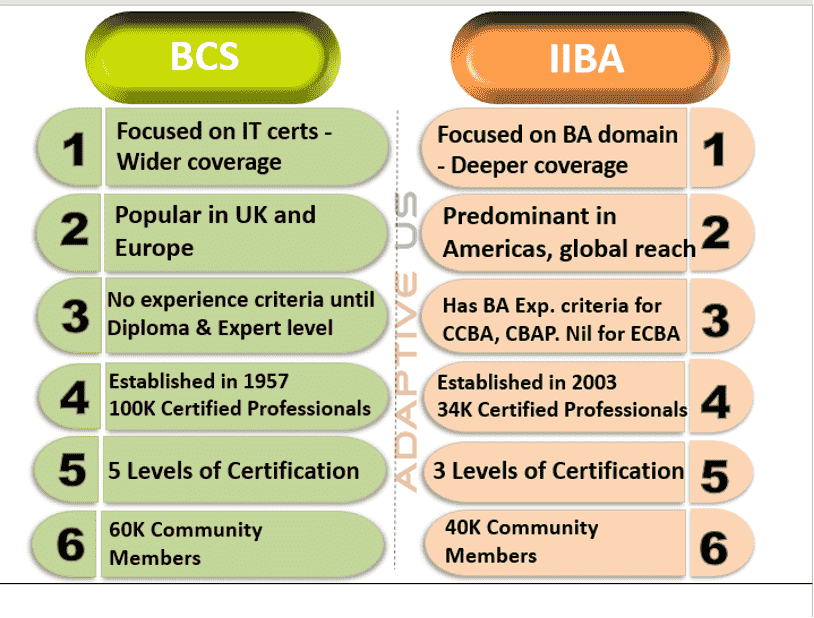BCS vs IIBA: Understanding the certifications for Business Analysts
As a business analyst seeking professional development opportunities, you may have come across multiple certifying bodies/organizations. And the few prominent ones among them are IIBA, PMI-PBA, BCS, and IREB. We will take a closer look at two such prominent certification bodies, BCS (British Computer Society) and IIBA (International Institute of Business Analysis), and discuss the various aspects in detail. These organizations offer certifications and resources to enhance your skills and advance your career in the field of business analysis. In this blog post, we will delve into the differences between BCS and IIBA, helping you navigate their offerings and make informed decisions about your professional training path.
Focus and Scope:
BCS: The BCS, also known as The Chartered Institute for IT, provides a broader range of certifications and professional development programs beyond business analysis. They cover various areas of IT, including project management, software development, and data management. BCS offers certifications such as the BCS Diploma in Business Analysis and the BCS International Diploma in Business Analysis. BCS was established in the UK in the year 1957.
IIBA: The IIBA is solely dedicated to the field of business analysis. It focuses exclusively on advancing the practice, standards, and recognition of business analysis professionals worldwide. IIBA offers core certifications like the Entry Certificate in Business Analysis (ECBA), Certification of Capability in Business Analysis (CCBA), and Certified Business Analysis Professional (CBAP). It also offers non-core certifications like Certification in Business Data Analytics (CBDA ), Agile Analysis Certification (AAC), Certificate in Product Ownership Analysis (IIBA®-CPOA), and Certificate In Cybersecurity Analysis (CCA). These certifications specifically cater to the needs of business analysts and demonstrate expertise in the field. IIBA was established in Canada in 2003 (around 50 years later than BCS).
Global Recognition:
BCS: The BCS certifications are well-respected and recognized globally, though they are more popular in UK and Europe since it was founded in the UK. They hold credibility in the IT industry, encompassing a broader range of disciplines beyond business analysis.
IIBA: As the leading professional association for business analysts, IIBA certifications are highly regarded within the business analysis community. IIBA has established a strong presence worldwide, promoting the value and importance of business analysis in various industries.
Certification Levels and Requirements:
BCS: BCS certifications are available at five different levels, allowing professionals to progress from foundational to more advanced qualifications. Each level has specific requirements, including a combination of exams and practical experience. It has no experience criteria until Diploma and Advanced level.
IIBA: IIBA core certifications are also structured into 3 different levels, offering a clear path for career progression. The ECBA certification is designed for entry-level professionals, while the CCBA and CBAP certifications target more experienced practitioners. Each level has specific eligibility criteria, including the number of years of business analysis experience and professional development hours. CCBA requires 3750 hours (approximately 2.5 years) of Business Analysis experience, while CBAP requires 7500 hours (approximately 5 years) to be eligible to appear for the exam.
Body of Knowledge:
BCS: The BCS certifications cover a wide range of topics related to business analysis, including requirements engineering, process modeling, and stakeholder management. They provide a comprehensive understanding of various aspects of business analysis within the context of broader IT disciplines.
IIBA: IIBA certifications are grounded in the globally recognized standard for business analysis, known as the BABOK® Guide (Business Analysis Body of Knowledge). The BABOK® Guide defines the core knowledge areas, techniques, and competencies required for effective business analysis practice.
Community:
BCS has a global community of 60K community members, while IIBA has a global community of 40K members. IIBA has an active community with local chapters and many chapter events being organized for knowledge sharing and networking.
BCS has about 100K certified professionals across all levels, while IIBA has about 34k certified professionals across all levels.
Conclusion:
Both BCS and IIBA offer valuable certifications and resources for business analysts, but their focus and scope differ. BCS provides certifications across various IT disciplines, while IIBA concentrates exclusively on business analysis. Consider your career goals, the specific needs of your role, and your professional aspirations when deciding which organization's certifications align best with your objectives.
Ultimately, whether you choose BCS or IIBA, obtaining a certification from a recognized professional body will enhance your credibility, open doors to new opportunities, and demonstrate your commitment to continuous professional development in the field of business analysis.
Remember, your journey as a business analyst involves lifelong learning, staying up-to-date with industry trends, and continuously refining your skills. Choose the path that aligns with your aspirations and sets you on a trajectory toward success in the dynamic world of business analysis.

You May Also Like
These Related Stories

Top 20 Business Analyst Certifications For 2024

Adaptive US ECBA Study Guide - Clear and Concise


No Comments Yet
Let us know what you think